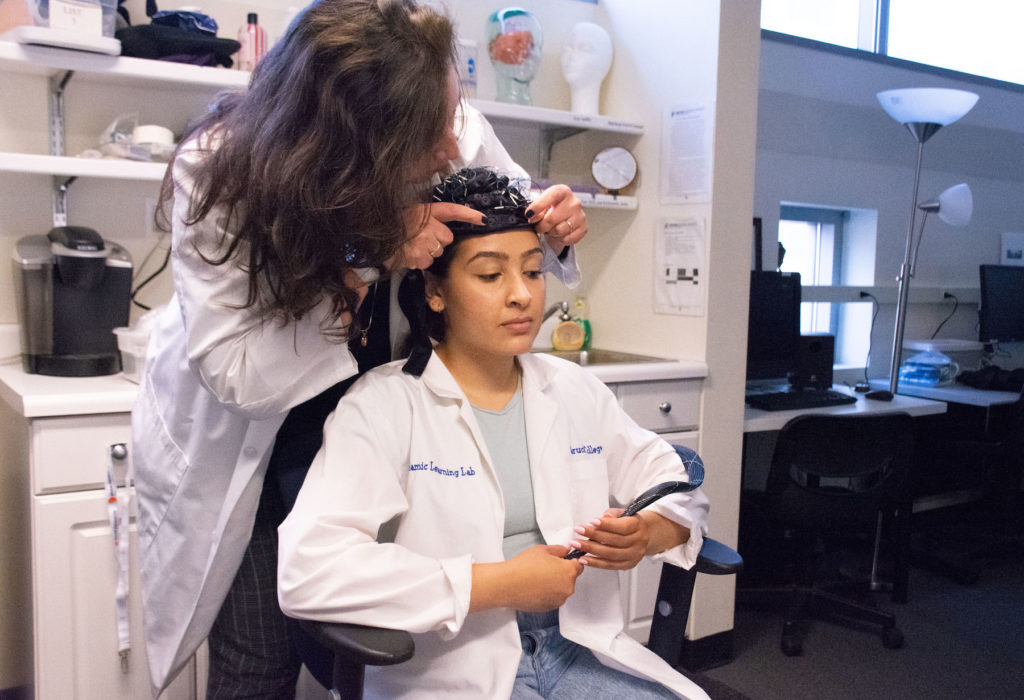
Current projects
Rewarding Effort
What are the best ways to motivate people to put effort into difficult learning and memory tasks (i.e., tasks where they make mistakes and have setbacks before ultimately succeeding)? Do rewards for “just trying” (but not succeeding) help or hinder effort and learning? If they help, what type of reward do people find to be the most motivating? These are some of the questions that our Rewarding Effort research program tries to answer, using both behavioral (performance) and neurophysiological (EEG/ERP) methods. These methods not only allow us to determine what types of rewards are effective and when, but also “why,” in terms of the underlying cognitive and neural processes of learning that rewards modulate. Interested in volunteering as a research assistant or becoming a participant in this study? Contact us!
Collaborative Memory
How does remembering information with a group differ from remembering on your own? Remembering events in a group is called Collaborative Memory and is both an everyday part of recreation and bonding between others, as well as task-oriented part of study groups or work decisions. By having others with us who may retrieve information better than ourselves, systematic errors or faults in our memory may be prevented, but retrieving information with others can also reinforce certain types of errors as well. Our current research program on Collaborative Memory addresses questions such as how structured retrieval discussions between group members might help or hurt overall accuracy and influence confidence (metacognition) in our memories. We also ask, how does the social make-up of the group influence memory and decision making during collaborative memory? Since collaboration involves working with others, this type of retrieval is also subject to the influence of social dynamics of group membership and conformity on memory, which we are exploring in specific ways. Interested in volunteering as a research assistant or becoming a participant in this study? Contact us!
Previous projects
Social Cognitive Neuroscience Studies of Achievement
Funded by: CUNY, NIH
Additional Collaborators: Geraldine Downey (Columbia), Tory Higgins (Columbia)
How can students best achieve even under challenging circumstances? This research program examines how students’ motivation for achievement and other relevant personality attributes influence the types of strategies they rely on when faced with academic difficulty. In particular, we look at how these strategies influence both neural (brain) and behavioral responses to feedback in challenging academic tasks. Neural measures are made with EEG (Electroencephalography), a non-invasive way of measuring how neurons signal to each other in the human brain. The results of these studies inform interventions that can help students to achieve at their fullest potential.
Decision Making in Social Networks
Funded by: U.S. Army Research Laboratory Network Science Collaborative Technology Alliance (ARL NS-CTA)
Primary Collaborators: Sibel Adali (Rensselaer Polytechnic Institute, Lead), John O’Donovan (University of California Santa Barbara), Jin-Hee Cho (ARL), Jonathan Bakdash (ARL), Kevin Chan (ARL), Scott Rager (Raytheon BBN Technologies)
Nowadays, individuals have access to vast amounts of information almost instantaneously through the internet. Often, they find themselves relying on the posted opinions of others they may or may not know personally to make decisions. In this heavily networked world, what cues are used to decide if a source should be trusted or not? What are the conditions under which this information will be used to shape behavior and when will it be rejected? We are working within a computer-science based framework that focuses on the interplay between cognitive trust and distributed decision making in composite networks, with an emphasis on diverse network properties, including perceptual features of the network nodes, qualities of the information content shared by those nodes (i.e., competence and credibility), and the flow of information between them (i.e., reliability and latency).
